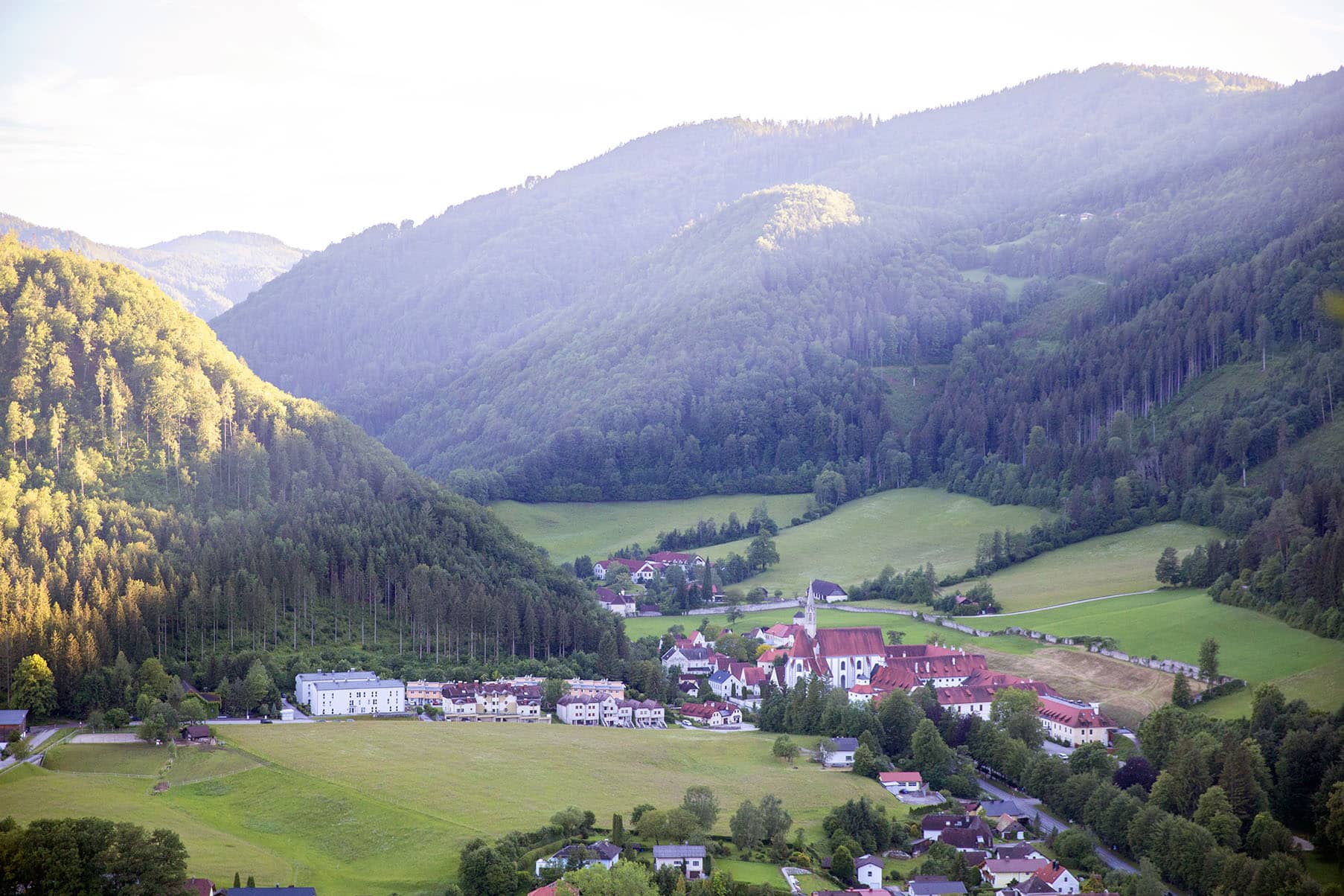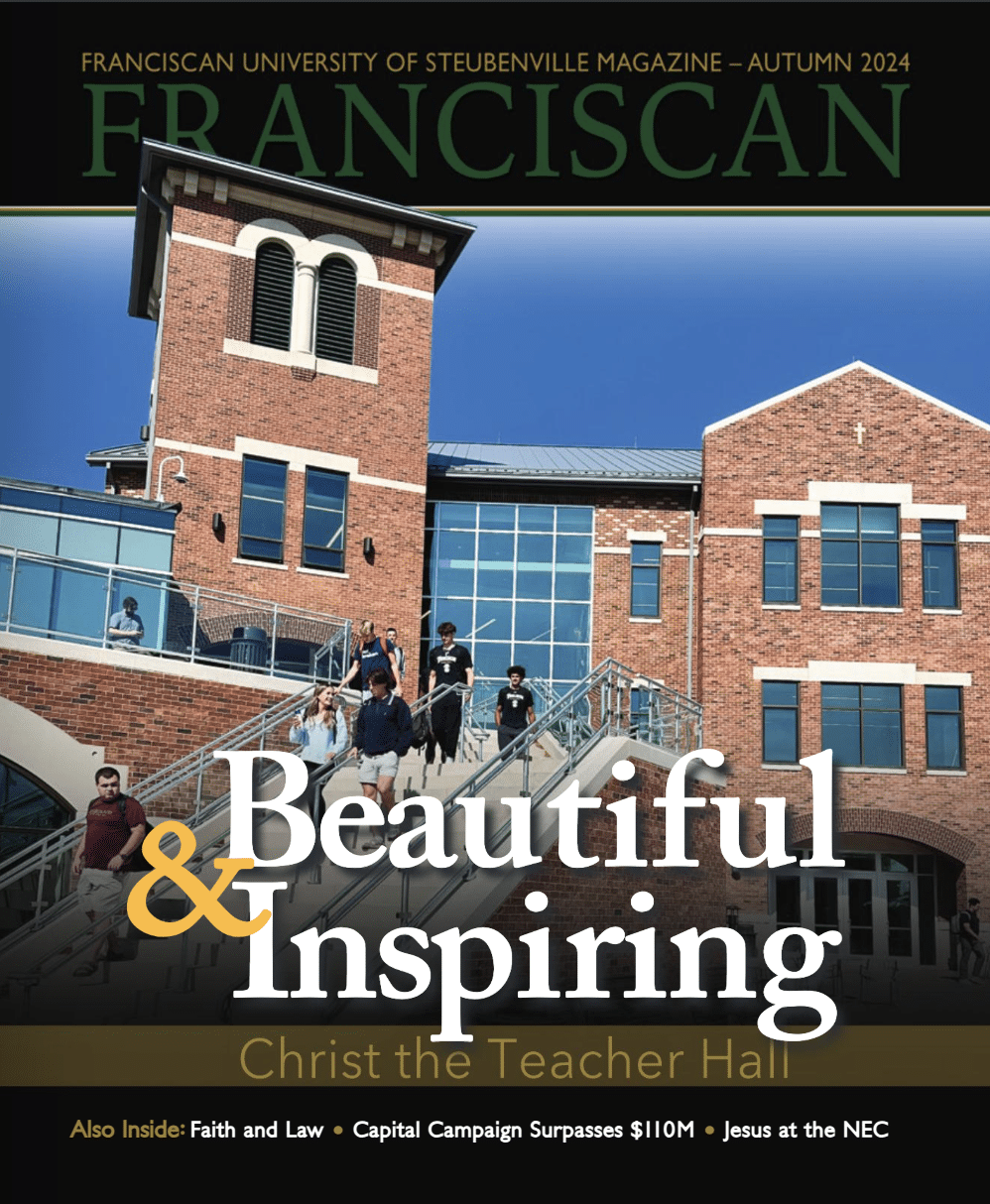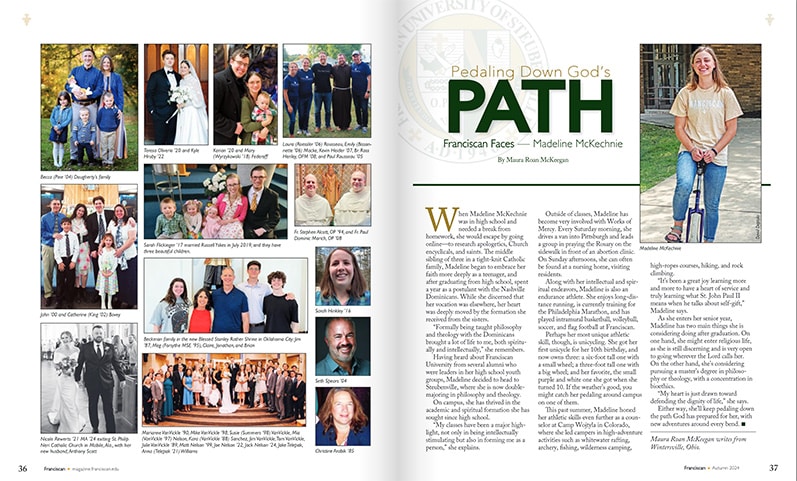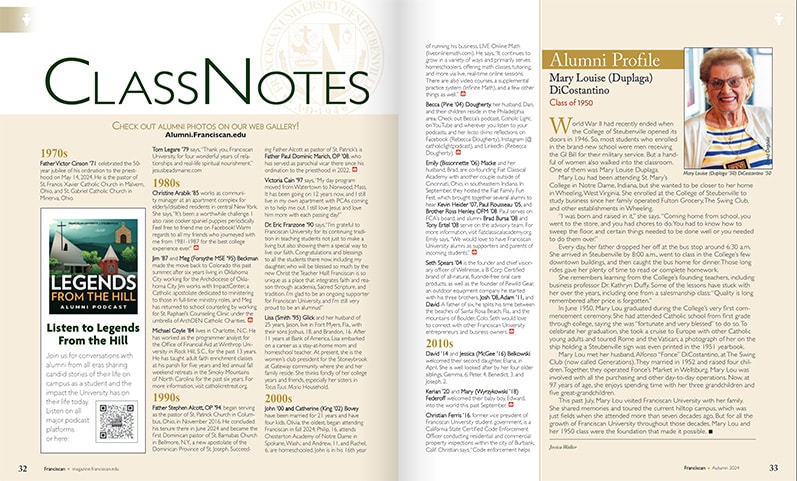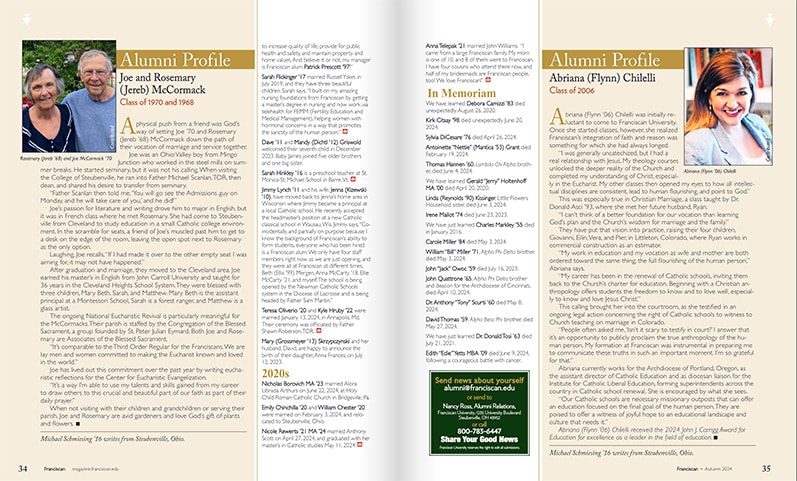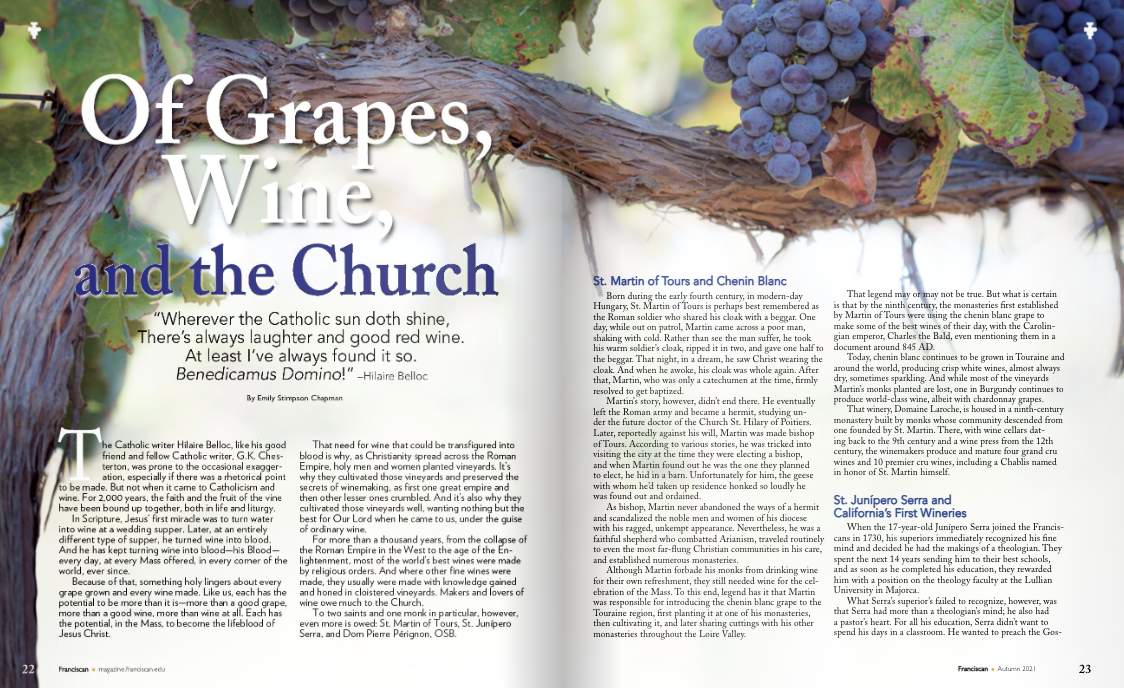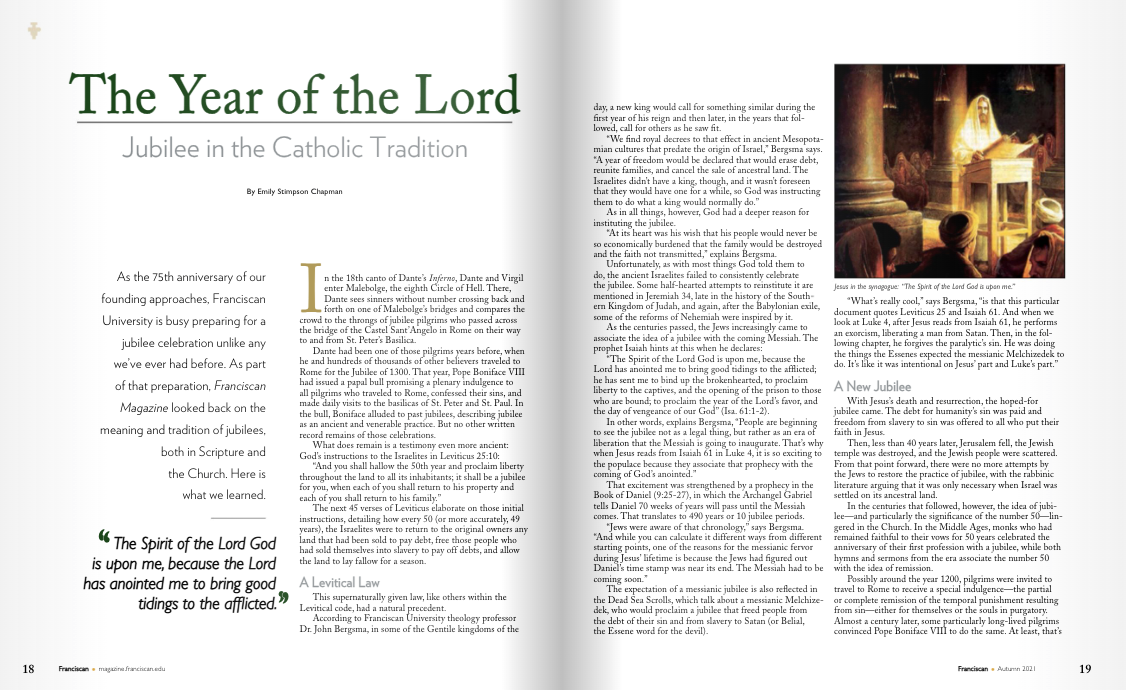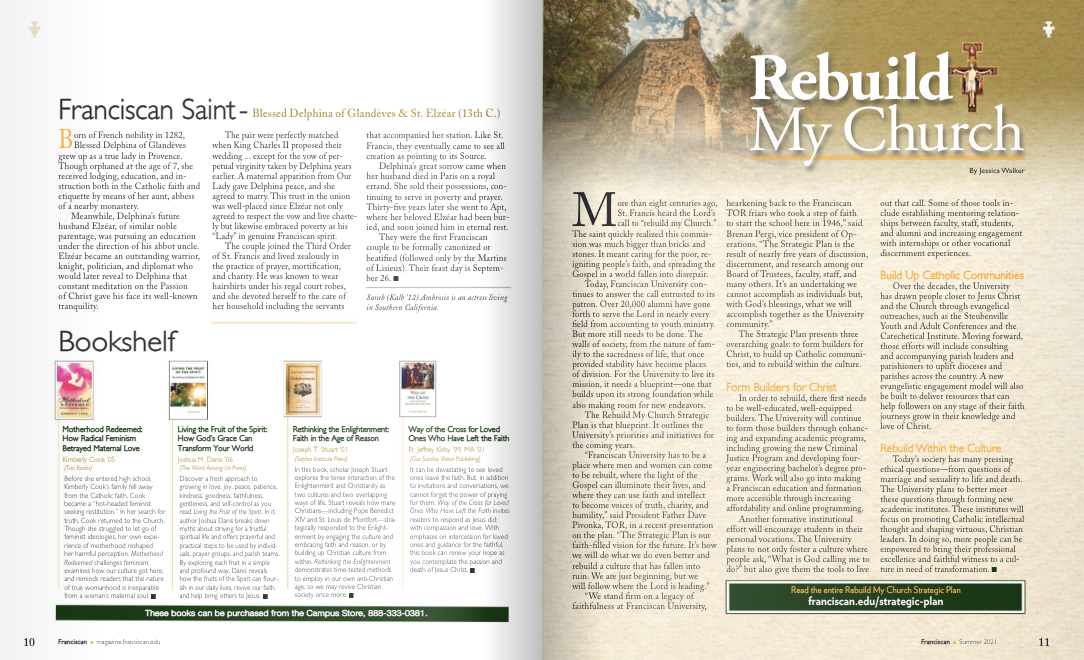Austrian folk music pours from the ballroom’s windows into the mountain valley. Dancers are clad in their finest trachten fashion, the ladies’ colorful dirndls flaring as they twirl.
The instructor guides them through quick steps. The dancers dutifully spin, jump, and try not to tromp on their partners’ feet.
Nearly a month ago, these dancers were strangers. Now, they’re dancing and laughing together in a restored 14th-century Carthusian monastery in Gaming, Austria—all because of Franciscan University’s new Austria Summer Experience.
Travel Plans
The masterminds behind the Austria Summer Experience are psychology professor Dr. Matthew Breuninger and philosophy professor Dr. Brandon Dahm. The previous summer, they piloted a three- week class called From Gluten to Glory at the Kartause Maria Thronus Iesu, Franciscan’s study abroad site in Gaming. A dozen Franciscan students made the journey overseas to learn about virtue and sourdough bread making. The experiment was a success.
So, Breuninger and Dahm planned to hold their bread class again. They also enlisted fellow professors to add five one-of-a-kind courses on iconography, marketing, parenthood, pilgrimage, and Catholic author J.R.R. Tolkien. Everyone was invited to join this new adventure.
Eighty people said yes.
Some were college students—several from Franciscan but many from universities far and wide. Others were nontraditional students, including young adults with careers and parents with college-age children of their own. The youngest had just graduated from high school; the oldest were in their 50s and 60s. They came from the United States, Australia, England, Italy, and Lebanon. And they had 80 different reasons for deciding to fly to Austria in May 2024.
But for three weeks, they all called the Kartause home.
Class in Session
The 9 a.m. church bell tolls. Class begins.
<img class=”alignnone wp-image-3137 size-full” src=”
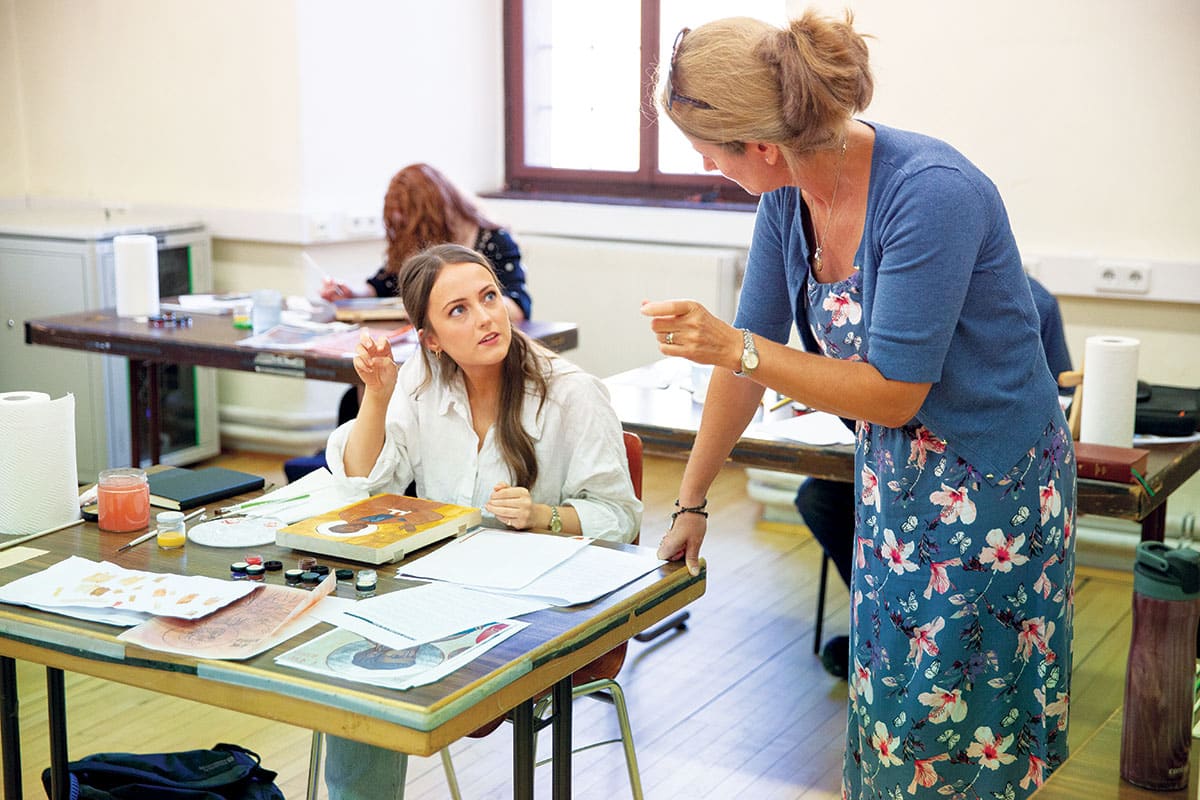 ” alt=”” width=”1920″ height=”1080″ />
” alt=”” width=”1920″ height=”1080″ />
Near the Kartause’s kitchen, the bread class students toss flour and water into bowls. Upstairs, theology professor Dr. William Newton lectures on iconography. He then cedes the floor to artist Claire Newton, who patiently helps students write icons of St. Joseph. Encouragement like “you’re nearly there” or “add a touch of glue here” blends with chant music playing in the background.
Down the hall, the content marketing class is creating a marketing plan for a real client: the Kartause’s brewery. At the helm is Professor JoAnn Sciarrino, director of the MBA Program. By the end of the course, they will pitch their ideas to Austrian Program Director Tom Wolter, complete with a sample website, video, social media, and suggestions for the tour and retail space.
<img class=”alignnone wp-image-3137 size-full” src=”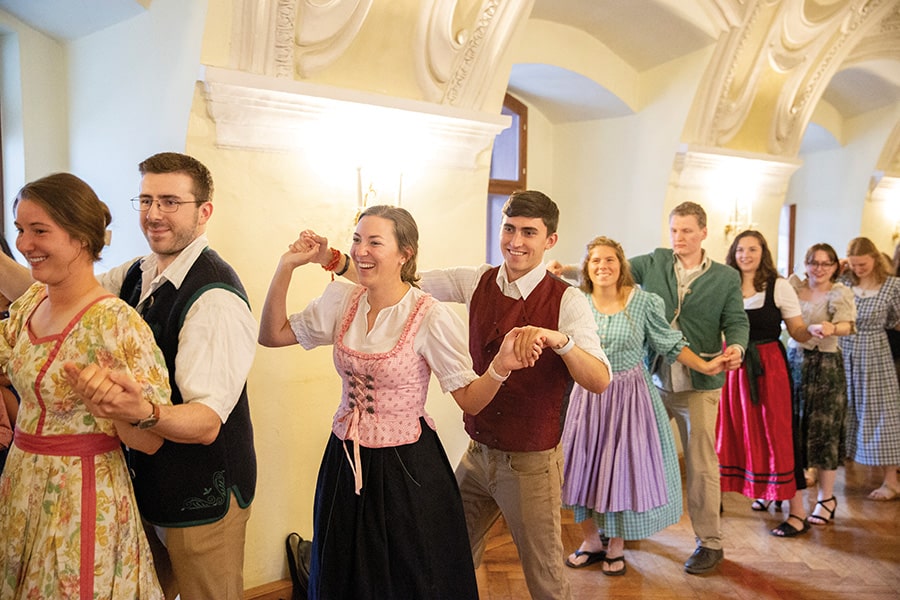 ” alt=”” width=”1920″ height=”1080″ />
” alt=”” width=”1920″ height=”1080″ />
Next door to the marketing class, English professor Dr. Ben Reinhard slaps a copy of J.R.R. Tolkien’s Smith of Wootton Major against a desk. He brandishes a whiteboard marker.
“What do you see? What’s interesting? What’s weird? What’s worth talking about?”
Students volunteer thoughts about the novella. Someone points out a passage she liked.
“Those are absolutely fascinating lines,” Reinhard says. “Break them open for me.”
And on it goes. It’s a friendly, lively discussion—the kind of discussion of which Tolkien and his literary group, The Inklings, would have no doubt approved.
One member of Reinhard’s Inklings is Elie Eid. From Lebanon, Eid heard about the Austria Summer Experience on Catholic speaker Matt Fradd’s Pints With Aquinas podcast. Eid mentioned it to his family; they surprised him with the trip as a Christmas gift.
Eid worked in the financial industry but decided a few years ago to write a novel full-time. The Tolkien class has helped him reflect on his craft. Perhaps even more impactful has been the shared rhythm of life centered on the sacraments.
“Every day, you have adoration and then Mass. All this, day after day, fills you with life and with power and with hope,” he says. “Then you have the interactions with all the students, and you get to meet lovely people.”
That’s why holding the Tolkien class at the Kartause is unique, explains Reinhard.
For Tolkien, “his liturgical prayer, his scholarly work, his family, all these things simmered together to make his imagination what it was. Here, it’s almost like a lab- oratory to recreate an orderly life. We live together, we go to Mass together, we go for walks together.”
Ultimately, Reinhard says, it’s “an invitation to a reenchanted view of life.”
On the Journey
“Let’s toss a coin.”
The group of about 15 students are at a crossroads. One sign for Mariazell points right. Another sign points left. But the tossed quarter—and a passing German-speaking couple—say to go to the left.
Earlier that morning, a busload of students departed from Gaming for a nearby trailhead at Ötscher-Tormäuer Nature Park. They said a Rosary for pro-life intentions and then began their 18-mile walk to Mariazell. They wandered next to a roar- ing river and through deep gorges. By the afternoon, they’ve paced themselves into smaller groups. (The group that goes left? Turns out it’s a longer option.) But they all touch the red doors of the stunning Marian basilica in time for 4 p.m. Mass.
The Mariazell pilgrimage is just one of many Austria Summer Experience activities that make it truly, well, an experience. Some classes have their own excursions. Marketing students visit Austrian breweries to do research for their marketing plan. Bread students rise before dawn to knead dough at a local bakery. But each day’s schedule includes a community-wide activity. There are trivia and movie nights. Theology on Taps and praise and worship. Hikes to caves and waterfalls.
Although decades apart in age and from different corners of the world, students talk over cups of coffee or outside on benches. They lounge at the local pool or take afternoon trips to the lake. They play games in St. Francis Hall past midnight.
“To see young people being so in love with the Lord and trying to build up their life in the right way and grow in virtue, it was really beautiful.”
<img class=”alignnone wp-image-3137 size-full” src=”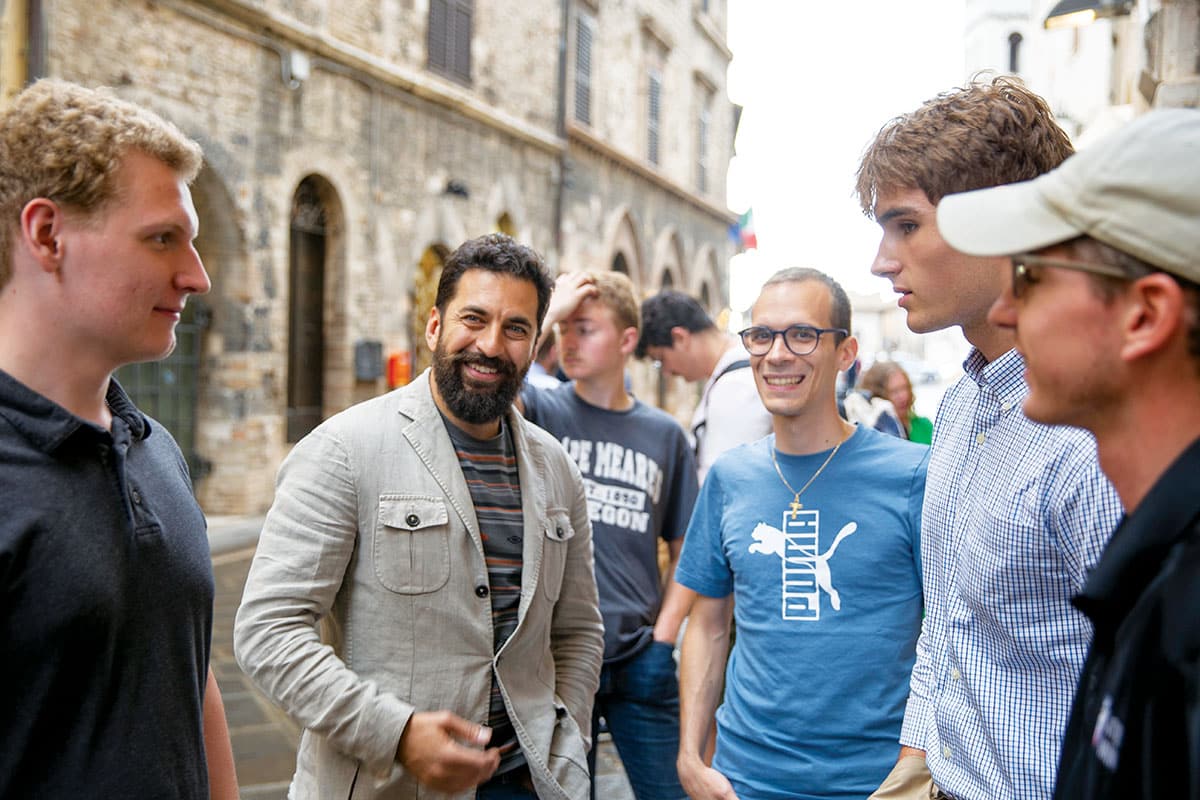 ” alt=”” width=”1920″ height=”1080″ />
” alt=”” width=”1920″ height=”1080″ />
For Francesco Borgogni from Turin, Italy, this authentic, Catholic community brought to life what he learned in the parenthood class, taught by Matt Fradd, philosophy professor Dr. Robert McNamara, and his wife, Caroline McNamara.
“To see young people being so in love with the Lord and trying to build up their life in the right way and grow in virtue, it was really beautiful,” Borgogni says. “Also, the community that is here at the Kartause, seeing the families and the kids, how they relate to each other, and they relate with you, it was so amazing. It’s something you don’t see normally. I think it’s a big sign of hope for the time we live nowadays.”
Mary Diana Szulc, a nontraditional student who came from Virginia for the iconography course, also says she appreciated the community.
“In the mensa for meals, I kept switching tables. It seemed like everybody would come together in different groups, so you got to see so many people from so many different walks of life,” she says. “Having Franciscan students, students from other universities, those who have graduated, those who are in the working world, and those from different countries just kept blending aspects of community, culture, faith, traditions, and values. It was a beautiful melting pot.”
<img class=”alignnone wp-image-3137 size-full” src=” ” alt=”” width=”1920″ height=”1080″ />
” alt=”” width=”1920″ height=”1080″ />
When in Rome
The train rumbles through the Italian countryside toward the ancient town of Spoleto.
“Long pilgrimages and hikes are generally not my thing,” says Kedon Gumerson, a sophomore theology major from Franciscan.
His 60-liter backpack sways on the train’s overhead rack. Across the aisle from him are Cassie Paschos, an occupational therapy student from Elizabethtown College, and Alexandria Westhoff from Virginia. The three pilgrimage class students are accompanied by Franciscan University President Father Dave Pivonka, TOR ’89, history professor Dr. Jeffrey Hass ’90, and Andrea Krenn, who is officially the Austrian Program office manager but, more importantly, this expedition’s leader.
For the next three days, the six intrepid pilgrims (plus one tagalong writer) will walk more than 40 miles of the Via di Francesco, following a section of it from Spoleto to Assisi. In the classroom in Gaming, the students learned about the philosophy, theology, history, and art of pilgrimage. Now, they’re going to walk one.
Officially, classes have ended. However, half the Austria Summer Experience participants have elected to go on an optional eight-day Rome and Assisi trip. Most of these travelers will explore the Eternal City and then meet the pilgrims in Assisi.
But back to the pilgrims. Why would someone who doesn’t hike choose to walk for days?
“I needed to be challenged physically but also spiritually,” Gumerson explains. “If you take the pilgrimage on as a challenge and something that you’re going to offer up, then it can genuinely change you.”
Father Dave echoes that idea during Mass that evening. He says pilgrimage is a journey to the heart of the Father. He encourages the pilgrims to write down their prayer intentions and remember them when the road becomes rough in the days ahead.
“There was a lot of doubt the night before. Do I actually want to do this?” Paschos later reflects. “The intentions people were sending me, though, I thought, ‘No, I have to do this. For them, I have to do this.’”
<img class=”alignnone wp-image-3137 size-full” src=” ” alt=”” width=”1920″ height=”1080″ />
” alt=”” width=”1920″ height=”1080″ />
Buon Cammino
The next morning, the pilgrims follow the Via di Francesco’s yellow and blue signs down cobbled streets. They follow them by stone walls and gardens thick with the scent of jasmine. And they follow them right out of Spoleto.
Eight hours, one wrong turn, and several salami-and-cheese sandwiches later, the pilgrims reach the secluded hamlet of Campello Alto. There, they have Mass, devour homemade pasta, and get much-needed sleep—before doing it again the next day.
Walking a pilgrimage is hard. There are 15-pound-plus backpacks to carry, mountains to climb, and blisters to endure. But, as Father Dave says during daily Mass, one of the greatest lies is that life isn’t supposed to be hard.
“In the midst of the difficulty and the struggle, we realize God is present. He has not abandoned us,” Father Dave says.
God is indeed found in the difficulty. There are the Rosaries prayed and sufferings offered, especially when the gravel path turns into unyielding asphalt. There are the holy places seen, from grand churches to the cave where St. Francis slept. There are the conversations had, from Krenn’s creative sayings (“I feel like a boiled chicken,” on one hot day) and Hass’ historical tidbits to hours-long chats over dinner. There are the people met, from fellow pilgrims to the Franciscan sisters who open their humble convent to visitors and bid farewell by saying, “See you again.”
Together, the pilgrims find comfort in the uncomfortable. And on the third day, they march up the hill to Assisi’s Basilica of St. Francis. They see the crypt of the saint in whose foot- steps they just walked before reuniting with the larger group.
Westhoff says one spiritual lesson came from the weight of her backpack.
“The things you’re attached to and you think you need in your life, you realize really quickly what is a need and what is not,” she says.
“I’ve gained the confidence to help me spiritually,” Paschos says. “Even during those few days, it was very moving to see what I could do and what I need to rely on others for.”
<img class=”alignnone wp-image-3137 size-full” src=”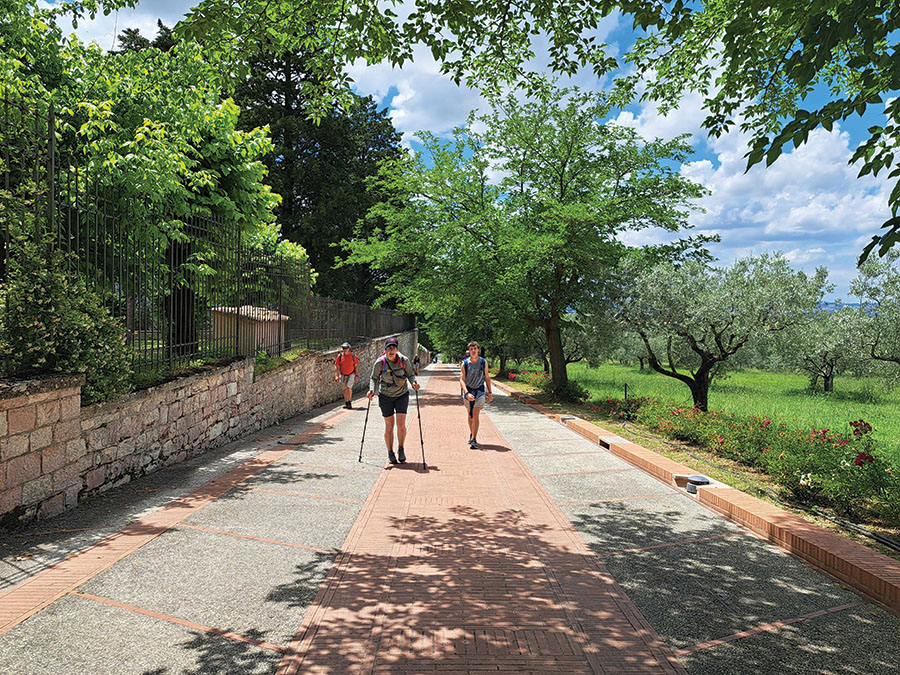 ” alt=”” width=”1920″ height=”1080″ />
” alt=”” width=”1920″ height=”1080″ />
“The shared experience of everyone on the trip is just something that’s really difficult to articulate,” Gumerson says. “It’s something no one else outside of the seven of us experienced in the way we did. There’s a specialness and a fruitfulness to that.”
He laughs. “But my feet are still sore.”
Even beyond the pilgrimage, the Austria Summer Experience was a shared experience. It provided 80 people with the opportunity to learn something new. To visit sites steeped in centuries of history and prayer. And to be open to encounters with God and with one another.
So much so that, when they say goodbye and depart for their homes, it doesn’t feel like goodbye. It feels like “see you again.”
For info about the 2025 Austria Summer Experience, visit austria.franciscan.edu/austria-summer-experience.



